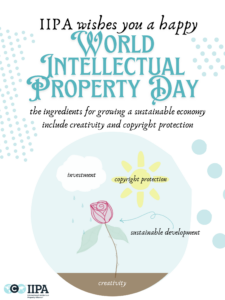
Happy World IP Day! Because the World Intellectual Property Organization (WIPO) designated IP and Sustainable Development Goals (SDGs) as the theme of this year’s World Intellectual Property Day, it is worth considering the importance of strong copyright protection to sustainable development. WIPO describes SDGs as, “a blueprint for people, peace, prosperity, and our planet.” Protection of intellectual property rights is critical to innovation and creativity, which spurs social, economic, and environmental sustainability. For example, documentaries, science fiction novels, works of indigenous art, and video games have long inspired and educated people to make progress on many of the SDGs identified by the United Nations. Ensuring adequate protection for creative works is therefore integral to the continuing education and inspiration of generations to come.
More fundamentally, ensuring fair and effective protection and enforcement of copyrights in foreign markets directly benefits not only U.S. creators, but also local creators around the world. Building a common sustainable future that incentivizes creativity, production, and economic development requires countries to put in place strong copyright protections. According to the U.N., “[d]eveloping countries face many challenges exporting their creative economy outputs,” but “the creative economy [is] an important tool for building a sustainable, inclusive, and equitable future” and “a powerful force for good, livelihoods, social cohesion, and economic development.” A couple of recent headlines in Thailand and Kenya illustrate the cultural and economic importance of copyright protection for local creators and consumers in those countries.
In Thailand, copyright law has become a powerful tool to protect the cultural significance of locally-designed fabric patterns. Visitors to Thailand cannot miss a pervasive symbol of Thai culture – elephant pants. The Thai government recently began a campaign to promote the “soft power” of the symbolic elephant pants. For example, to increase foreign cultural awareness of these unique garments, the Thai government planned an event for February of 2024 in which contestants would try to break the Guiness World Record for most pairs of elephant pants put on in one minute. Unfortunately, some local critics disparaged these efforts because most Thai elephant pants are actually imported from other countries. These pants are sold for pennies on the dollar compared to those made in Thailand. The critics highlighted that using elephant pants as a symbol of Thai culture was disingenuous when foreign interests are profiting off the campaign.
Local press has reported that the Director General of the Department of Intellectual Property, Wutthikrai Leeviraphan, has determined that the designs featured on the pants are “unique designs, created by Thais” that are protected by copyright, and “unauthorized reproduction or commercial use without permission from the copyright holder is strictly prohibited.” The good news is that Thai Prime Minister Srettha Thavisin recognizes that this unfortunate series of events is a strong reminder that the Thai government should improve copyright protection and enforcement. The Thai Intellectual Property Department is now working with Customs to investigate and stop the importation of elephant pants that infringe copyright, and a raid in Bangkok’s Bang Khun Thian district resulted in the seizure of 30,000 unlawfully imported elephant pants.
As Thailand takes a positive step to improve border enforcement, across the world, the government of Kenya is taking steps to ensure local creators can enjoy the benefits of copyright protection under Kenyan law. In particular, at the Kalasha International Film and TV Festival, the Kenya Film Commission and the Copyright Tribunal, a “quasi-judicial body,” curated sessions to educate creators and local industry about Kenyan copyright law. Intellectual property lawyers volunteered time to answer questions and host panels for local creators interested in understanding how to protect their works. This is one of several copyright law clinics organized by the Kenya Film Commission to arm local creators with advice and information on copyright law.
This effort was made in part to celebrate the accomplishments of the Kenyan film community and “highlights the significance of collaborative efforts in promoting a flourishing and sustainable film and television industry in Kenya.” This collaboration will hopefully encourage local creators to take full advantage of Kenya’s copyright system, incentivizing Kenya’s creative ecosystem to flourish, thereby promoting sustainable economic and social growth in that country.
As these recent events illustrate, creators and governments around the world are increasingly recognizing the importance of copyright protection and enforcement in their countries for their economies and cultures. This in turn supports the sustainable development goals that are central to the theme of this year’s World IP Day. IIPA will continue to work towards improving copyright protection and enforcement around the world, which benefits not only the U.S. creative industries, but also local creators and consumers.
